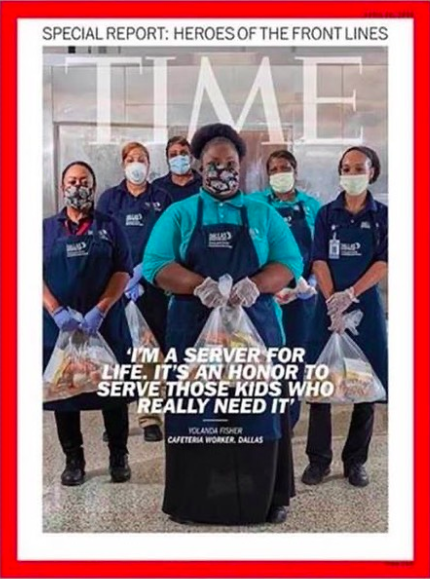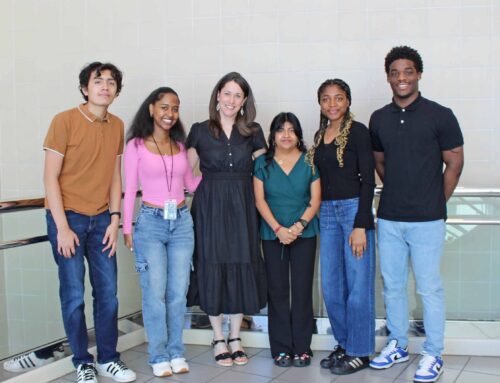
Photo and caption courtesy of Time magazine: From left to right: Porsche Lacey (food service assistant), Keke Lafayette (food service assistant), Shannon Wiggins (food service assistant), Yolanda Fisher (cafeteria manager), Pamela Harrington (food service assistant), and Katrina Parker (food service assistant) Elizabeth Bick for TIME
A Dallas ISD food and nutrition services worker is front-and-center on the cover of Time magazine last week.
The magazine tells stories of 12 people working on the front lines of society during the coronavirus crisis, including Yolanda Fisher, 48, who works at T.W. Browne Middle School in Oak Cliff. She is pictured with five of the school’s food-service assistants.
Here is Fisher’s story, from the magazine:
I’m still going to work because we’re still feeding the kids—it’s not just kids that attend my school, it’s any child that stayed in Dallas and they need a meal. And if a family is really in need, we give the adults a meal as well. When it first started we would come in from 6:30 in the morning until 5 in the evening, working weekends and stuff, but now it’s leveling off. I’m loving it because I miss [the kids’] faces. You miss hearing their noise. We are feeding our community, and I love that.
I’m very nervous [about contracting the virus]. I have two grandchildren at home, aged 4 and 9. I could harm my family if I bring something home. That’s always in the back of my mind. We have gloves, we wash our hands, we have sanitizers. The mask I have I purchased on my own—the school didn’t have masks. They told us we could tie a bandana around our face, that that would work.
My daughter takes my temperature every day I come home. If she wants to spray me down with Lysol that’s fine, anything to alleviate her fears. My daughter at one point said, ‘Mom you’re older, older people are dying, you can stay home,’ but I was like nah. Jesus was a server. That’s my purpose. That’s why I’ve been in this business 26 years. Most people look at us as a cafeteria lady, I look at it as a service. If there wasn’t an epidemic we would be still serving kids who probably would not get another meal until the next day. It’s an honor for us to serve those kids. —As told to Alana Abramson





